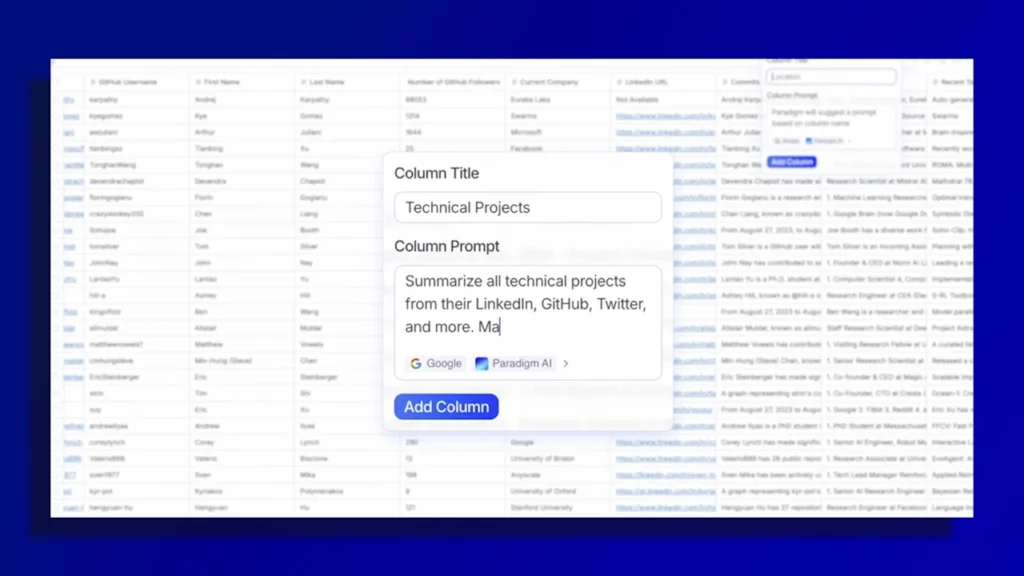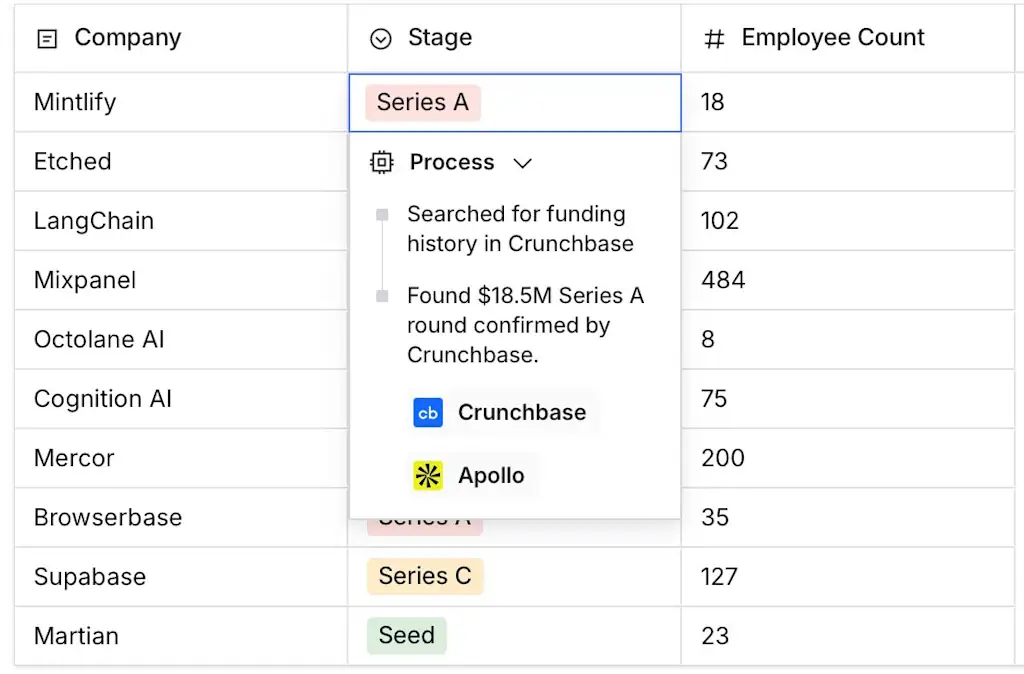
A decade ago, Ben Collins quit his job as a corporate accountant and started teaching other people how to use spreadsheets more effectively.
That move, terrifying as it seemed at the time, paid off brilliantly. Today Collins is the proprietor of an online spreadsheet training academy and the author of a weekly newsletter dedicated entirely to Google Sheets tips. Some 50,000 people subscribe.
And yet once again Collins is finding himself facing a sense of uncertainty over what’s next—as the very nature of what a spreadsheet even is enters a dizzying spiral of transformation.
“We’ve had more innovation in the last two years than in the 20 before that,” Collins says, referencing the explosion of generative AI technology and its effect on the spreadsheet arena.
He isn’t exaggerating. Up until recently, figuring out how to use a spreadsheet to its full potential was akin to learning a foreign language: You had complex formulas, mountains of cryptic functions, and a labyrinth of overwhelming options to decipher. If you were trying to do anything beyond just putting a few pieces of basic data into cells, you practically needed a dedicated spreadsheet expert to figure out how to make it happen.
But generative AI is currently reshaping the humble and stubbornly complex spreadsheet—which, for the most part, seems to be a good thing. After all, no one wants a massive project (or migraine) every time the need for crunching numbers comes up. And while generative AI has plenty of issues both practical and ethical, working within the confines of a single spreadsheet and the black-and-white world of objective data seems to be where those limitations are least troubling, and where AI’s strengths are primed to shine.
Still, there’s no escaping that a whole new era is upon us. The biggest question now is how, exactly, it all plays out from here—and whether the need for a spreadsheet expert, be it an independent consultant like Collins or the go-to problem-solver within any office or organization, is bound to evolve or destined to become a relic from a bygone time.
The spreadsheet in the AI era
When Collins quit his accounting job in 2014 and embarked on a self-made, spreadsheet-centric career path, Anna Monaco was 11 years old.
Today, at the ripe old age of 22, Monaco is the founder and CEO of Paradigm, a next-gen spreadsheet service that makes Excel look like an abacus by comparison.

The idea behind Paradigm is to take all the complexity and manual effort out of spreadsheets and make managing data simple. Instead of worrying about formulas and functions and formatting, you just upload your data—or even tell the service what sort of data you need and let it source it for you.
Paradigm creates your spreadsheet, makes it look slick and professional, and suggests next-step actions to work with the data and put it to practical use.
“Manual data entry shouldn’t exist,” Monaco says. “We’re not just a spreadsheet. We’re replacing weeks of labor.”
Paradigm and its AI-centric spreadsheet startup contemporaries—services such as Sourcetable, Grid, and Julius—aren’t only replacing labor. They’re also replacing an entire way of thinking about spreadsheets and their role in our lives.
And while the reigning spreadsheet-service royalty aren’t exactly rushing to rebuild their long-established interfaces, the same basic principle is already appearing in those environments as well, albeit on a much smaller scale and in a more tacked-on sense.
To wit: Microsoft’s AI Copilot is now thoroughly integrated into Excel and can be summoned to help you create formulas and analyze data without needing to do all the traditional heavy lifting. And Google is doing something similar with Gemini in Sheets, now making the chatbot available on demand in any cell with a simple (though extremely familiar-feeling to any longtime spreadsheet user) “=AI” command for summoning its assistance.
“You don’t need to be an AI or spreadsheet expert to do it,” Google wrote in its announcement of the expansion.

Of course, not everyone is ecstatic about the in-your-face AI in those more traditional spreadsheet setups—especially people who aren’t seeking out such features and find their presence can be annoying or even downright dangerous. AI features often insert themselves into situations regardless of whether they’re actively summoned. And while AI-introduced errors within a spreadsheet generally seem at least a little less egregious than generative AI at its most hallucinogenic, Microsoft is warning that Copilot is best suited for “scenarios where deterministic accuracy is not required” and not for “any task requiring accuracy or reproducibility” (ouch).
So where, then, does all of this leave the spreadsheet experts—folks like Ben Collins who have spent decades building up deep knowledge in the inner workings of the spreadsheet and all the logic around it?
The answer, it turns out (much like the conventional spreadsheet itself) is complicated.
Expertise, reinvented
Collins sees what’s happening with spreadsheets at Google and Microsoft, and at the more ambitious scrappy spreadsheet startups like Paradigm, as an unambiguous net positive.
“All the AI stuff is democratizing spreadsheets in the same way it’s doing for coding,” he says. “It lets more people have access to those insights and that knowledge rather than just the technically savvy crowd.”
And yet—like in so many other industries right now—it’s impossible to avoid questions over the effects this shift could have on the future. We’re all living through a transition where some say AI is taking away countless jobs and others insist it’s creating as many as it’s killing, or at the very least just changing what types of roles matter. As with many careers, the only real certainty surrounding spreadsheet-related professions right now is a complete and utter sense of uncertainty.
Collins, for his part, remains upbeat. He says he’s seen a shift in the sort of information knowledge workers are seeking around spreadsheets but that he continues to see a strong demand for a deeper understanding of the tools themselves and the data philosophies around them.

“There’s still a need to have a foundation of knowledge and an understanding of how these things work,” Collins says, even if only so you can figure out how to ask an AI assistant for what you need and then assess the quality of what you’re given in return.
“It’s less emphasis on pure syntax and the mechanics and more [on] how we can use these tools at a higher level and be more effective,” he adds.
Collins also notes that for all the buzz around newer AI-centric spreadsheet tools, the vast majority of people—and businesses—are so deeply engrained in the Google or Microsoft ecosystems and so familiar with those environments and the security assurances around them that they won’t be making a major night-and-day change anytime soon. Even if AI does slowly seep its way into their work within those domains.
That’s a point Monaco is well aware of. She sees Paradigm as being less of a play at pulling the masses away from Sheets or Excel and more of a forward-looking option for a different generation of businesses.
“There’s a new way that companies are being built, where smaller teams are commanding a lot more resources and doing a lot more powerful things with the resources they have,” she says. “Paradigm is building for that future.”
One thing she and Collins agree on is that the need for expertise isn’t going anywhere. Monaco says she’s already seeing the emergence of what she calls “Paradigm consultants”—people who specialize specifically in supporting the tool she created and helping users figure out how to get the most out of it.
“It’s a different expertise,” Monaco says. “There’s still a huge value in becoming a power user and knowing how to harness these tools. There’s an even bigger value now that these tools are more powerful.”
Collins also envisions his role evolving. And he is 100% up to the challenge of adapting right alongside that.
“The need for training is as strong as ever,” he says.
And that, it seems, is something where a genuine human touch and the type of critical-thinking perspective AI can’t entirely emulate remains—for the current moment, at least—as important as ever.


